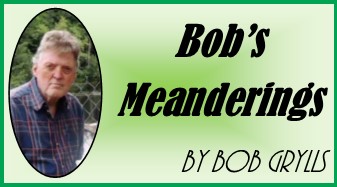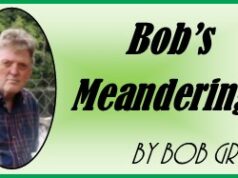The telephone call came out of the blue Thursday evening jarring me from a crossword puzzle – one of those tough ones I was sweating over. It was the WDRA secretary saying she had tried every committee member and I was the last straw. Could I lay the wreath for Remembrance Day the next morning?
I’d never done this before, assuming it was only for the privileged. After confirming that there was absolutely no one else, I agreed, only to find out the wreath was stuffed away in one of the hockey rink’s storage cupboards. I went to the rink immediately and after a frenzied search found it. But the ribbon with our WDRA logo was missing from the wreath. That meant a delay the next morning, nearly making me have second thoughts about the debacle, before I was able to engineer an acceptable ribbon.
As well as the wreath-laying stress, I was on an assignment for Whitewater News to capture the celebration with pictures. Between the camera bag, a notepad and no gloves, I was in a flap like the flapping flag over the cenotaph due to a brisk east wind. While asking a buddy to hold the camera bag I raced to the hall to score a pair of matching oven mitts for my already freezing hands. A kind lady noticed me at the drawer of the mixed-up mitts and said, “You can’t wear those oven mitts, you’ll look like a fool out there. Here take my gloves.” I did and it saved my fingers enough to push the camera button. Things were going well as I was getting all the pictures I needed from near the cenotaph until it was my turn to lay one down. I scurried back to where I thought I’d left my wreath but couldn’t find it. In a bit of panic, looking everywhere as the crowd was becoming impatient with the too long pause, my tongue slipped and I said to out loud, “Where the hell is it.” I don’t think everyone heard my faux pas but for sure our Member of Parliament must have as she was nearby. I felt bad about that but what the heck!
Then this other lady also came to my rescue. She was scurrying along with the wreath from the opposite side of the cenotaph. I quickly retrieved it, turned back and was surprised that my military escort was on the ball and right there as if he had been tracking my haphazard expedition for a lost ‘ark’. I managed to get to the cenotaph and plunk the wreath with its holder onto the ground without a screw-up.
Later I reflected on the cenotaph itself. This memorial was dedicated on a Saturday in August of 1995, 50 years after the end of World War II. There was a parade of veterans from the area, stretching more than a block long. It began at the former Westmeath Public School, come down Main Street and was to turn right at Grace Street then over to the cenotaph itself. Because my father was in the parade, all my siblings and our families were waiting in front of my Dad’s house for it to pass. We saw it up the street coming in our direction. Suddenly the unthinkable happened. Somebody jumped the gun and turned a block too early and we missed the whole shebang. What a disappointment. Somebody should have shot that person for the misfire!
Some years ago, I did a story of Emmett Ethier for the Cobden Sun. He was a World War II veteran, a paratrooper with many drops behind enemy lines. Being a neighbour of mine made it easier to arrange interviews and shoot a picture of him before publication. The horror stories he revealed brought shivers to my spine but more importantly a fresh perspective on the conditions and suffering those soldiers had to endure.
Sandra (Pietersma) Jeffrey, a resident of Westmeath or Beachburg — depending on who you are talking with — was just sixyears old and living in the Netherlands when the war ended. She vividly remembers ‘Freedom’ as it was referred to. A few days later she excitedly witnessed the Canadian’s victory march through her town. Canadian soldiers had been stationed less than a block from the family home in times preceding the end. They were kind to her family and occasionally brought them snacks that were unavailable. Sandra had her first taste of chocolate pudding back then and it has been a favourite ever since. Her family came to Canada when she was 12 years old. She and other family members are grateful to this very day for the influence those soldiers had on their lives.
So many years after the wars, both tales of heroism and dismay, continue to seep out. When I am honoured to hear one of them, I only wish I could share it to the world because whatever the story, it is not only part of history but of utmost importance to the family of those who served.





![Kenopic/Smith Auction [Paid Ad]](https://whitewaternews.ca/wp-content/uploads/2018/10/advertising-100x75.jpeg)

